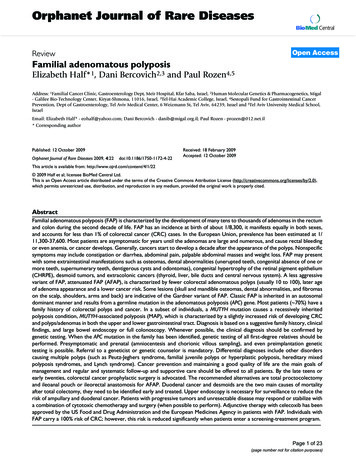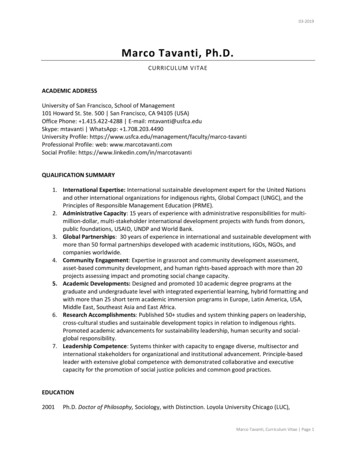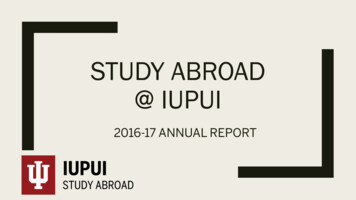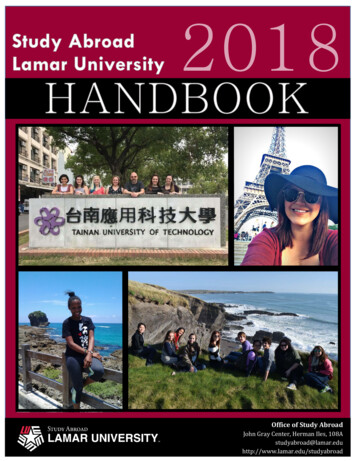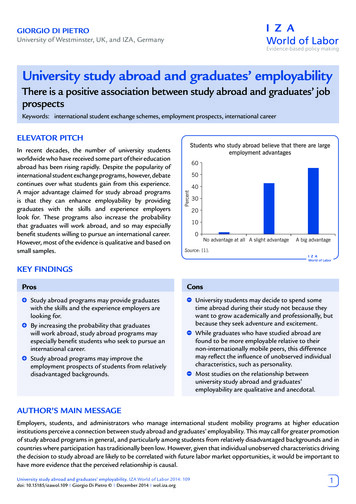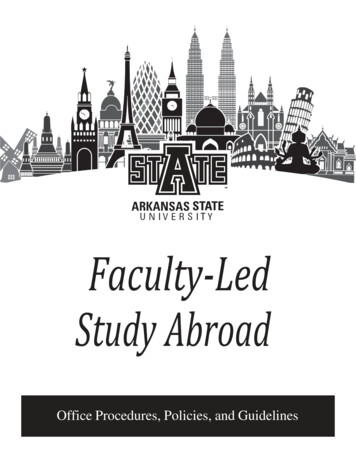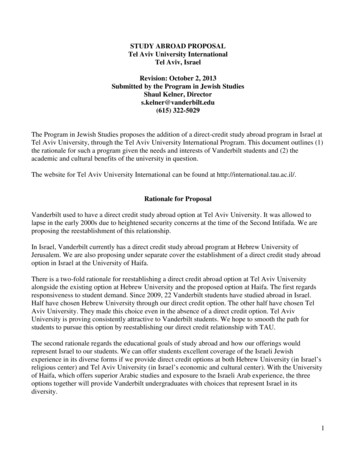
Transcription
STUDY ABROAD PROPOSALTel Aviv University InternationalTel Aviv, IsraelRevision: October 2, 2013Submitted by the Program in Jewish StudiesShaul Kelner, Directors.kelner@vanderbilt.edu(615) 322-5029The Program in Jewish Studies proposes the addition of a direct-credit study abroad program in Israel atTel Aviv University, through the Tel Aviv University International Program. This document outlines (1)the rationale for such a program given the needs and interests of Vanderbilt students and (2) theacademic and cultural benefits of the university in question.The website for Tel Aviv University International can be found at http://international.tau.ac.il/.Rationale for ProposalVanderbilt used to have a direct credit study abroad option at Tel Aviv University. It was allowed tolapse in the early 2000s due to heightened security concerns at the time of the Second Intifada. We areproposing the reestablishment of this relationship.In Israel, Vanderbilt currently has a direct credit study abroad program at Hebrew University ofJerusalem. We are also proposing under separate cover the establishment of a direct credit study abroadoption in Israel at the University of Haifa.There is a two-fold rationale for reestablishing a direct credit abroad option at Tel Aviv Universityalongside the existing option at Hebrew University and the proposed option at Haifa. The first regardsresponsiveness to student demand. Since 2009, 22 Vanderbilt students have studied abroad in Israel.Half have chosen Hebrew University through our direct credit option. The other half have chosen TelAviv University. They made this choice even in the absence of a direct credit option. Tel AvivUniversity is proving consistently attractive to Vanderbilt students. We hope to smooth the path forstudents to pursue this option by reestablishing our direct credit relationship with TAU.The second rationale regards the educational goals of study abroad and how our offerings wouldrepresent Israel to our students. We can offer students excellent coverage of the Israeli Jewishexperience in its diverse forms if we provide direct credit options at both Hebrew University (in Israel’sreligious center) and Tel Aviv University (in Israel’s economic and cultural center). With the Universityof Haifa, which offers superior Arabic studies and exposure to the Israeli Arab experience, the threeoptions together will provide Vanderbilt undergraduates with choices that represent Israel in itsdiversity.1
Located in Israel’s cultural and economic center, Tel Aviv University is Israel’s largest university. Itwas created in 1963 out of several pre-existing institutes. It now houses some 30,000 students, 106departments and 90 research institutes. Tel Aviv University’s international program offers over 30courses per year in English. Tel Aviv University’s international program has existing relationships witha number of universities, including New York University and Boston University, among others.Sponsorship and AdministrationJewish Studies is sponsoring this proposal. It can provide guidance and advising to students on courseselection, but it will not be involved in selecting and/or approving students for study abroad at Tel AvivUniversity.The Global Education Office will be the responsible party at Vanderbilt for approving students to studyabroad. GEO will also maintain primary responsibility for monitoring the Tel Aviv UniversityInternational program. The Jewish Studies program will provide support to GEO, to assist it in itsmonitoring duties. We have met with Tom Bogenschild of GEO, and he has confirmed GEO’s supportfor this proposal.A supporting letter from GEO acknowledging and explaining their role in the administration of thisprogram has been sent by GEO as an addendum to this proposal. GEO’s administration of the TAUprogram will be similar to the arrangement for GEO’s administration of the Hebrew University program.(For details on application procedure and GEO’s role, see below, “Eligibility, Application andSelection.”)At Tel Aviv University, student selection and program administration are under the auspices of TAUInternational (http://international.tau.ac.il/), headed by Dean Neil Gandal and English-language programdirector Maureen Meyer. Associate Director Tal Eidelman serves as academic advisor to students there.A team of four resident assistants are a first point of contact for students, providing assistance andguidance, and helping students address any problems that might emerge. They are supervised by JeniaGilgoulin, Head R.A.Melea Rubinstein, Director of US Admissions for Tel Aviv University International, works out of theuniversity’s Manhattan offices and serves as liaison with partner institutions in the United States. She,along with Ms. Meyer, met with GEO Assistant Director of Operations Isabelle Crist at the NAFSA:Association of International Educators conference in St. Louis in June 2013.Academics and RequirementsStudents at Tel Aviv University’s international program learn Hebrew and take college level courses inEnglish for credit while immersed in Israeli culture. International students may enroll in Tel AvivUniversity’s semester or yearlong study abroad program through their home school.Vanderbilt University will grant no more than 18 credits for a semester abroad and requires that studentstake a minimum of 12 credits. (VU tuition is for 12-18 credits). Students at TAU International typicallyenroll in five courses (15 credits) each semester. In addition, TAU International requires students to take2
an intensive Hebrew language course (“ulpan”), which runs for 7 weeks in the summer prior to the Fallsemester and for 4 weeks in the winter prior to the Spring semester. The Fall Hebrew ulpan awardsstudents 6 academic credits upon successful completion. The spring Hebrew ulpan awards 4 academiccredits. For all administrative purposes, including tuition payment and credit transfer, the ulpan isconsidered to be part of the semester abroad (i.e., not a summer program or a “winterim”). Placementinto the appropriate ulpan level is determined by a language placement exam administered at Tel AvivUniversity prior to the start of the language classes. Native Hebrew speakers may request to take anulpan-exemption test.A student taking the ulpan and the normal five course load at TAU international would earn 21 TAUcredits for the Fall semester (6 15) or 19 for the Spring (4 15). Because of Vanderbilt’s caps on studyabroad credit transfers, only 18 of these credits would transfer to Vanderbilt. Students, guided by GEOand their academic advisors, would choose which of the courses to request credit transfer for. This is asimilar situation to that which entails for students enrolling at Hebrew University.All of the courses for international students are taught in English (with the exception of the Hebrewlanguage ulpan). Fluent Hebrew speakers may, with permission, enroll in up to two courses from theuniversity-wide course offerings. Courses are taught by a mix of tenure-line members of the regularTAU faculty as well as faculty with appointments in the International School.TAU International also offers a special program for pre-med and other health/science students.Sponsored jointly with Assaf Harofeh Medical Center, the program, “A Voyage to Medicine in Israel,”offer a combination of academic courses (Health & Psychology; History of Medicine in the Holy Land;The Circle of Life: From Birth to Old Age; Clinical Laboratory in Medicine; Introduction to ClinicalResearch; Physiology and Sports Medicine), practical experience in the medical field (a First Aid coursewith Israel’s Red Cross affiliate, Magen David Adom; a Trauma Life Support course at the IsraeliMedical Corps; and volunteering on an ambulance), and experience shadowing members of the clinicalresearch staff at the medical center. The program is conducted in English, and has specializedrequirements, and a higher tuition. Details are available at age-to-medicine-in-israel.html.Asupporting note from the Health Professions Advisory Office, which assists Vanderbilt undergraduatestudents interested in attending health professions graduate school has been forwarded to DeanRapisarda under separate cover.Departments and CoursesTel Aviv University’s International program offers a variety of courses in the fields of Jewish Studies,Israel Studies, Middle East Studies, Arts, History, Religion, Management and more.Below is a course list showing the broad range of courses available to international students at Tel AvivUniversity. Links to course information is available via the Tel Aviv University website. Also availablethere is information regarding the faculty that will teach each course.Courses would be deemed eligible for Vanderbilt credit via the standard departmental evaluationprocess, (i.e., review and approval or rejection by relevant department chair /program director or directorof undergraduate studies).3
2012-2013 Course List: Arabico Introduction to Modern Standard ArabicArt Studieso Acting Workshopo Creative Writingo Fictional Film Directing Workshopo Introduction to Israeli Art: From The Founding of Bezalelo Israeli Cinema and the Culture of Modern Israelo Israeli Society Through the Cinematic Lenso Music And Society in Israelo Screened Ideas: Thinking Through Film And TelevisionHumanitieso Techno Utopia or Cyberspace as American Culture: A Short History of the DigitalConditionIsrael Studieso Israeli Politicso One Hundred Years: History and Memory in Tel Aviv-Jaffao The Zionist Movement: From a Vision To a State 1870-1967Jewish Studieso After Auschwitz: Images of the Holocaust in Contemporary Cultureo Contemporary Jewish Issueso History of Anti -Semitismo Jewish Education The Reality and the Visiono Jewish Identity in Israel and the Diasporao Jews on Trialo Judaism And Christianity in Conflicto Modern Jewish Historyo The Essence of Judaismo The Jews and the Passion, From the Gospels to GibsonLife Scienceso Israel and the EnvironmentManagement and Economicso Business Ethicso The Israeli EconomyMiddle East Studieso Foreign Policy of the U.S. 1945-1990: The Middle East and the Arab Israeli Conflicto Ideologies and Intellectual Movements in the Modern Middle Easto Introduction to the Religion of Islamo Israel and the Middle Easto Politics, Religion and Terror in the Middle Easto Radical Islamic Movementso The Struggle for Palestine: The Roots of the Arab-Israeli ConflictSocial Science4
o Introduction to Anthropologyo Introduction to Psychologyo Sociology of ReligionGradingThe following is the grading system used at Tel Aviv University’s International program:A 97 -100%A 93 - 96%A- 90 - 92%B 87 - 89%B 83 - 86%B- 80 - 82%C 77 - 79%C 73 - 76%C- 70 - 72%D 67 - 69%D 63 - 66%D- 60 - 62%F 59% and underCalendar2013 Fall Semester Undergraduate ProgramsFall/Year Program Group FlightJuly 16, 2013General Orientation & Hebrew Placement July 18, 2013ExamJuly 21 – Sept. 3, 2013Summer Ulpan*Fall VacationSep.09 - Oct. 06, 2013Fall SemesterOct. 06 – Dec. 19, 2013Semester ExamsDec. 15 - Dec. 19, 2013Last day in the dorms*Dec. 22, 2013* Fall students only. Year-long students retain their rooms throughMay.2014 Spring Semester Undergraduate Programs* Note: Ulpan is required for study abroad students only (Springsemester)Spring Program Group FlightJan. 13, 2014Arrival at TAU, SpringJan. 14, 2014General Orientation & Hebrew Placement Jan. 15, 20145
ExamWinter Ulpan - Hebrew LanguageProgram*--Spring SemesterPassover VacationMemorial DayIndependence DayShavuot VacationSemester ExamsLast day in dormsJan. 20 – Feb. 13, 2014Feb. 16 – May 22, 2014Apr. 8 – Apr. 23, 2014May 5, 2014May 6, 2014June 3-4, 2014May 18 – May 22, 2014May 25, 2014Eligibility, Application and SelectionTel Aviv University’s undergraduate semester- and year-long programs are open to students with aminimum GPA of 3.0 (equivalent to a B or 80%). There is some flexibility around this requirement.Students with lower GPAs are encouraged to apply as the student essay, teacher recommendations andother factors are also taken into consideration.There is no language proficiency requirement for students whose primary and secondary education tookplace in the U.S., Australia, Canada, Great Britain, Ireland, or New Zealand. All others mustdemonstrate English-language proficiency validated through a TOEFL test (minimum score: written582, computer-based 223, or iBT 89) or IELTS test (minimum score: 7).Vanderbilt’s own standard eligibility requirements as specified by the policies of the Colleges and by theGlobal Education Office would also be in force, including the requirement that A&S students mustcomplete one year of study at Vanderbilt before being eligible for study abroad. We recommend thatVanderbilt not impose any additional requirements beyond the normal GEO requirements. Please notethat Tel Aviv’s required 3.0 minimum cumulative GPA is higher than GEO’s required 2.7 minimumGPA.Students would apply to Tel Aviv University through GEO, just as they would with any other of theother programs on GEO’s approved list, using the study abroad software used for all other programs.GEO would advise and screen applicants according to established policies and criteria, in collaborationwith TAU offices. The details of these procedures would need to be worked out between GEO andTAU. GEO anticipates that it would either transmit information collected in the Study Abroad systemfor qualified applicants, or assist students in completing additional forms required by TAU. Acombination of the two is most likely, and these details will need to be negotiated. This is standardprocedure in most direct enroll programs, including with Hebrew University.TAU requires that applicants submit a personal essay, two letters of recommendation, and officialtranscripts.6
The creation of a direct credit study abroad option at Tel Aviv University would serve a diverse array ofstudents from a variety of majors. Although the Program in Jewish Studies is serving as sponsor of thisproposal, this proposal is not intended to primarily serve Jewish Studies majors, nor does experiencesuggest that it would. Since 2009, 22 Vanderbilt students have studied abroad in Israel, half at HebrewUniversity through the direct credit option and half at Tel Aviv University in spite of the lack of a directcredit program. Of these 22, only 2 have been Jewish Studies majors. (One of those was a triple HistoryJS-Psychology major.) 91% of the students studying abroad in Israel since 2009 have not been JewishStudies majors. Three were majoring in Political Science (one a double major in Psychology), 3 inHOD, 2 in Communication Studies, and one each from BSCI, CE, ECON, FRE, PHIL, RLST, and Viola(Blair). Two had not yet declared.As is stated on the GEO website, GEO will give approval to study abroad, whereas the partner programprovider (here, Tel Aviv University International) will determine final acceptance to the program. Theadmissions determinations of Tel Aviv University International are based on academic merit and do notdiscriminate on the basis of race, sex, religion, color, national or ethnic origin, age, disability, or sexualorientation. The Jewish Studies program will not be involved in the screening or selecting of applicants.FacilitiesAll long-term students (semester/year) are housed in newly renovated dormitories located withinwalking distance from the Tel Aviv University campus. Dormitories are divided into suites of one ortwo bedrooms shared by two students per bedroom. Each suite is furnished and includes a kitchenetteand bathroom, air conditioning and wifi. The university does not supply household items such asblankets, pillows, towels, kitchen utensils and household goods. A self-service laundromat is locateddirectly across from the dorm complex. The dormitories have security guards in the building and requirestudent identification for entry.There is no inclusive meal plan at Tel Aviv University. Students may cook in their suites. There areseveral supermarkets nearby, as well as shops that sell prepared foods. University subsidized cafeteriason campus serve meals at reasonable prices. There are many restaurants and cafés in close proximity tocampus. Students should plan to spend up to 750 per month for food, independent travel, and incidentalexpenses.Mandatory health insurance for all full-time students at Tel Aviv University International is included inthe tuition fee. The policy is a basic health insurance plan that covers treatment in Israel by a largeselection of private, English-speaking doctors. It also covers hospitalization in public hospitals. Theperiod of coverage includes the ulpan period and all programs and vacation days. This insuranceprovides coverage for the student only within Israel. Optional health insurance coverage is offered fortravel outside Israel for an additional fee.Tel Aviv University requires that international students carry a cell phone with an Israeli number. Thisenables the program staff to contact all program participants at any time via SMS text messages or groupmessaging.7
Safety and securityStudents and parents can find security and safety information about study abroad locations at thefollowing websites, and, based on the information provided, can make informed decisions about whetherto participate in a study abroad program.GEO travel warnings and oad/index.cfm?FuseAction Abroad.ViewLink&Parent ID E83863BD-9A32-7CA0-B92DCF0450860B55&Link ID E838EC0F-B2DB-C9E1-9380F25D8F079B18&pID 13&lID 69Information for parents of students planning to study oad/index.cfm?FuseAction Abroad.ViewLink&Parent ID 1B2A7A72-9014-5C31-1BB54ED9994A1C4F&Link ID F1718224-C0A5-99AF-CF2F75ADDCD82D02&pID 7&lID 44Student International Travel avel-policy.phpCIEE, Health and ealth-safety/CIEE, Travel afety/Information about the City and the UniversityLocated in Israel’s cultural and economic center, Tel Aviv University is Israel’s largest university. Itwas created in 1963 out of several pre-existing institutes. It now houses some 30,000 students, 106departments and 90 research institutes. As we would expect from a university twice the size ofVanderbilt, it offers a full range of programs and courses across a wide variety of disciplines. Theuniversity boasts many distinguished faculty, including some whom Vanderbilt has recruited away,including Vanderbilt’s own Eugene Greener Professor David Wasserstein, a chaired professor in Historyand Jewish Studies who taught at Tel Aviv University.The city of Tel Aviv was founded in 1909 with a vision of establishing a modern Hebrew-speakingmetropolis. Today, Tel Aviv understands itself as the secular, progressive counterpoint to the religiouslyand politically conservative Jerusalem. (In American political terms, we might say that Tel Aviv playsblue state to Jerusalem’s red state.) International students who choose Tel Aviv University often chooseit over Hebrew University of Jerusalem, not because they are weighing the formal academic programs,but because they are specifically looking for the type of secular, urban experience that Tel Aviv offersand that Jerusalem does not. The choice of city’s factors heavily into student decision-making aboutwhere in Israel to study.Tel Aviv University sits on a beautiful campus located north of the city’s center. Tel Aviv’s museums,restaurants, theaters, concert halls, fashion district, parks and beaches are all just a short bus or taxi rideaway.8
OrientationMost US-based students travel together to Israel on a group flight, accompanied by program staff.Chartered buses take the students from the airport to the university, where they participate in anorientation to the study abroad program.Culture and ImmersionTel Aviv University International seeks to engage students with Israeli society and culture. The programarranges three excursions for students: one to the southern desert fortress of Masada, one to Jerusalem inthe country’s center, and one to the northern part of the country. The trips are also intended to helpenhance social cohesion among the among the students.International students are considered full members of the broader student body, and are welcome toparticipate in all regular Tel Aviv University clubs and activities. Events are publicized via postersaround campus. A calendar of events is also posted in the International Program offices.9
Tuition and FeesStudents would pay full-time Vanderbilt tuition for their period of study abroad; for semester oracademic year students this figure will vary according to actions taken by the Board of Trust every May.Such variance will also affect summer term students, although in this case the rate billed will also varyaccording to the number of academic credits students will take in either university and bring back toVanderbilt.Vanderbilt billing may include additional fees to cover local tuition fees that exceed those of Vanderbiltnet tuition as calculated by GEO, mandatory housing fees, or other assessments made by TAU. Thesefees will be set on an annual basis by GEO as they are for all other approved study abroad programs, andbilled directly to the student account. As with application procedures, GEO will need to work out thedetails and specifics of these billing procedures in cooperation with TAU and several business officeshere on campus once the programs are approved by the College.Tel Aviv University’s schedule of fees for its semester and year-long programs is presented below forreference purposes only.Semester/Year-long Programs 1,450A VoyageTomedicine 11,000 9,450 1,450 1,450 3,000 11,450 6,000 18,450SemesterTuitionLanguage (IntensiveHebrew/Arabic)RoomTotal 7,000Year 3,000 13,900A non-refundable 60 application fee is not included above.Full-time semester tuition includes 5 courses (excluding the mandatory Ulpan).Additional courses taken each semester cost 1,200 per course.Trips, Student Activities, Facility Fees and Health Insurance are all included in the tuitionfees quoted above.A student who loses his/her student card, medical insurance card or room keys will becharged 10 per item.###10
Appendix: Letter from Health Professions Advisory OfficeFrom: Baum , Robert robert.baum@Vanderbilt.Edu Date: Wednesday, April 3, 2013 10:18 AMTo: Shaul Kelner s.kelner@vanderbilt.edu Subject: RE: Study Abroad for Vanderbilt Pre-Med StudentsStudy Abroad Committee of the College of Arts and Science Committee on Educational Programs:I think the program proposed by Professor Kelner would have great appeal for a number of VanderbiltPre meds. The content appears to be well rounded and could be of benefit to a student’s learningexperience and also of value in helping build a strong application to medical school.Robert BaumRobert Baum, M.D.Director, Health Professions Advisory OfficeAssistant Professor Orthopedics and Rehabilitation11
Bremer, Jonathan EFrom:Sent:To:Cc:Subject:Attachments:Polavarapu, Prasad LTuesday, November 12, 2013 10:10 AMBremer, Jonathan ECampbell, Karen E; Rapisarda, Martin; Muise, Michael RStudy abroad programs-Tel Aviv and HaifaStudy Abroad Proposal - Tel Aviv.rev20131111.pdf; Study Abroad Proposal Haifa.rev20131111.pdfFollow Up Flag:Flag Status:Follow upFlaggedTo: A&S Faculty CouncilFrom: Prasad Polavarapu, Chair, Committee on Educational Programs (CEP)Ref: Study abroad programs-Tel Aviv and HaifaThe CEP met on September 24, 2013 to discuss the proposal submitted by Professor Shaul Kelner, AssociateProfessor of Sociology and Jewish Studies, for study abroad programs in Tel Aviv and Haifa. The committeeapproved the proposal with a vote of 6-0, subject to recommended revisions.The recommended revisions have now been incorporated.The revised proposals are forwarded with this email.Best,PrasadFrom: Muise, Michael RSent: Tuesday, November 12, 2013 8:38 AMTo: Polavarapu, Prasad LSubject: RE: proposals from Study Abroad Committee to CEPDear Prasad,I added the letter of support from GEO to each proposal. That’s the only extra thing I have.Sincerely,MichaelMichael MuiseAssistant RegistrarCollege of Arts and Science Registrar’s OfficeVanderbilt UniversityPhone: 615-343-3156Email: michael.r.muise@Vanderbilt.EduFrom: Polavarapu, Prasad LSent: Monday, November 11, 2013 4:30 PMTo: Muise, Michael RSubject: FW: proposals from Study Abroad Committee to CEP1
s.kelner@vanderbilt.edu (615) 322-5029 The Program in Jewish Studies proposes the addition of a direct-credit study abroad program in Israel at Tel Aviv University, through the Tel Aviv University International Program. This document outlines (1) the rationale for such a program given the needs and interests of Vanderbilt students and (2) the

